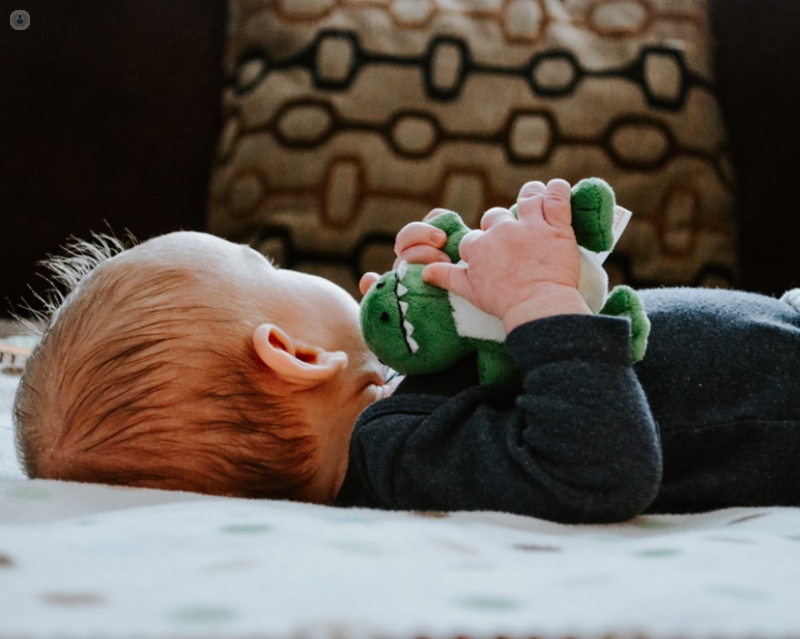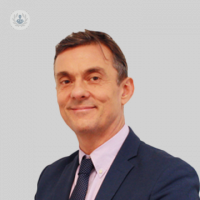Undescended testicles: how are they treated?
Written by:Undescended testicles are quite a common childhood condition. Shortly after birth, there is usually a routine check where the presence or not of two testicles is determined. If two are not found, then a referral to a surgeon such as Mr Simon Clarke is recommended around the time of three months, as still some testicles will drop down into the scrotum. There will be times however when the undescended testicles will need to be treated.

We spoke to leading paediatric surgeon, Mr Simon Clarke, to find out more about the condition and what can be done to solve it.
What are undescended testicles?
Undescended testicles are when your child's testicles are not in their usual place in the scrotum. Whilst your child is in the womb, the testicles are developing inside his abdomen. Towards the end of pregnancy, the testicles move through a passage into the scrotum. Your child's testicles should be in their scrotum by the time they’re 4 months of age. Usually only one of the testicles is affected. However, on rare occasions, both testicles fail to move to the scrotum.
For some children, their testicles may be in the scrotum for most of the time. However, sometimes the testicles cannot be felt there because they rise back into the body due to cold temperatures or an active reflex. You can find out if this occurs for your child by letting them have a warm bath then checking whether you can feel both testicles. If you find that this is the case, there should be no cause for concern.
What are the symptoms of undescended testicles?
Usually most of the symptoms will go unnoticed, other times you will not be able to find the testicles in the scrotum. Your child will not be in pain, and undescended testicles do not interfere with any bodily function.
If one testicle becomes twisted then this will be painful, either in the abdomen or the groin, depending on the location of the undescended testicle.
How are undescended testicles diagnosed?
The doctor of your child will need to determine whether their testicles are truly undescended or whether they have temporarily slid back into the body.
What causes undescended testicles?
Sometimes, the testicle does not descend due to other problems with the testicles or the male hormones.
We don't know exactly why this happens, but it is not due to anything that happened during pregnancy.
How common are undescended testicles?
This condition is quite common in premature babies. Around 1 in 20 male babies are born with an undescended testicle. In about 1 in 70 cases the testicle remains undescended.
How and when can undescended testicles be treated?
Undescended testicles are best treated in early childhood. They will need treatment as soon as possible as they do not develop properly if left in the abdomen or groin. The amount of sperm and fertility levels appear to be lower in men who have undescended testicles, and if it's not treated early in childhood, it can be even lower. This is due to how testicles need to be a few degrees cooler than the rest of the body to produce sperm.
It is impossible for men with undescended testicles to have checks for testicular cancer, as testicles cannot be felt in the abdomen.
If a doctor suspects the testicles have not descended due to a hormone problem, they may suggest your child takes a short course of a hormone called chorionic gonadotropin (hCG). If the doctors suspect that it isn't a hormone problem, or if hormone treatment doesn't work, your child will most likely need to undergo a short operation under general anaesthetic called an orchidopexy.
What is an orchidopexy?
Orchidopexy is an operation that brings the testicles down from the abdomen or groin to their usual place in the scrotum. This short operation is done under general anaesthetic, it lasts roughly 45 minutes. In many cases, it can be a day surgery and your child can go home the same day. Occasionally a child will need to stay overnight.
What happens prior to the operation?
Information should be given to you on how to prepare your child for the operation in your admission letter and welcome booklet. Your child shouldn't have anything to drink or eat beforehand for the amount of time specified by your doctor.
On the day of the operation, the surgeon will explain the operation in more detail. They will discuss any worries you or your child may have and ask for your permission for the operation. They should ask you to sign a consent form. An anaesthetist will explain your child's anaesthetic in more detail. If your child has any allergies or any health issues, it's recommended that you tell the surgeon.
If you’re looking for an expert paediatric surgeon who can treat undiagnosed testicles effectively, we recommend booking an appointment with Mr Simon Clarke today. Visit his Top Doctors profile for more information.


